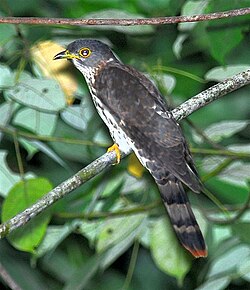Hierococcyx
| Hierococcyx | |
|---|---|
 | |
| Philippine hawk-cuckoo (Hierococcyx pectoralis) | |
| Scientific classification | |
| Domain: | Eukaryota |
| Kingdom: | Animalia |
| Phylum: | Chordata |
| Class: | Aves |
| Order: | Cuculiformes |
| Family: | Cuculidae |
| Genus: | Hierococcyx Müller, 1845 |
| Type species | |
| Cuculus fugax[1] Horsfield, 1821 | |
| Species | |
| 8, see text | |
Hierococcyx or hawk-cuckoos is a genus of birds in the family Cuculidae. They are distributed in South, Southeast, and East Asia.[2] The resemblance to hawks gives this group the generic name of hawk-cuckoos.
They are known to vocalize at their breeding grounds, making identification based on calls easy. [3]
It is sometimes included in the genus Cuculus.
It's similarity to hawks gave rise to an ancient belief that cuckoos transformed themself into hawks during the winter months, when cuckoos disappeared from Europe. [4]
Mimicry
[edit]Hawk-cuckoos closely resemble accipiters in terms of appearance, an elongated body with long wings and tail, greyish or brownish upperparts with paler barred upperparts, as well as their swift direct flight. [5]
Apart from shape and colour, underpart barring tend to increase alarm in small parts. This form of batesian mimicry makes the cuckoo look dangerous to the host, reducing host agression or Mobbing (animal behavior), resulting in more opportunities for the cuckoo to perform brood parasitism.[6]
Species
[edit]There are eight species:[2]
| Common name | Scientific name and subspecies | Range | Size and ecology | IUCN status and estimated population |
|---|---|---|---|---|
| Moustached hawk-cuckoo | Hierococcyx vagans (Müller, S, 1845) | southern Myanmar, Thailand, southern Laos, Malaysia, Singapore, Brunei, and Kalimantan, Sumatra and Java of Indonesia | Size: Habitat: Diet: | NT
|
| Large hawk-cuckoo | Hierococcyx sparverioides (Vigors, 1832) | Bangladesh, Bhutan, Cambodia, China, India, Indonesia, Laos, Malaysia, Myanmar, Nepal, Pakistan, the Philippines, Singapore, Taiwan, Thailand, and Vietnam. | Size: Habitat: Diet: | LC
|
| Dark hawk-cuckoo | Hierococcyx bocki Wardlaw-Ramsay, 1886 | northern Sarawak and Sabah. In Indonesia it is found on Sumatra and in Kalimantan. | Size: Habitat: Diet: | LC
|
| Common hawk-cuckoo | Hierococcyx varius (Vahl, 1797) | Indian subcontinent, from Pakistan in the west, across the Himalayas foothills, east to Nepal, Bhutan, Bangladesh and North East India | Size: Habitat: Diet: | LC
|
| Northern hawk-cuckoo | Hierococcyx hyperythrus (Gould, 1856) | eastern China, North and South Korea, far eastern Russia, Borneo, and Japan. | Size: Habitat: Diet: | LC
|
| Philippine hawk-cuckoo | Hierococcyx pectoralis Cabanis & Heine, 1863 | Philippines | Size: Habitat: Diet: | LC
|
| Malaysian hawk-cuckoo | Hierococcyx fugax (Horsfield, 1821) | southern Burma, southern Thailand, Malaya, Singapore, Borneo, Sumatra and western Java | Size: Habitat: Diet: | LC
|
| Hodgson's hawk-cuckoo | Hierococcyx nisicolor (Blyth, 1843) | north-eastern India, Myanmar, southern China and southeast Asia. 180px|alt=Map of range | Size: Habitat: Diet: | LC
|
References
[edit]- ^ "Cuculidae". aviansystematics.org. The Trust for Avian Systematics. Retrieved 2023-08-05.
- ^ a b Gill, F.; Donsker, D.; Rasmussen, P., eds. (January 2023). "Turacos, bustards, cuckoos, mesites, sandgrouse". IOC World Bird List. v 13.1. Retrieved 4 April 2023.
- ^ Eaton J (2018). "Identification of Hierococcyx hawk cuckoos, and the first record of Northern Hawk Cuckoo Hierococcyx hyperythrus for continental South-East Asia". BirdingASIA. 30: 68–73.
- ^ Pliny, in Rackham 1997
- ^ Davies NB, Welbergen JA (8 May 2008). "Cuckoo–hawk mimicry? An experimental test". Proceedings of the Royal Society B: Biological Sciences. 275 (1644): 1817–1822. doi:10.1098/rspb.2008.0331. PMC 2587796. PMID 18467298.
- ^ Welbergen JA, Davies NB (1 January 2011). "A parasite in wolf's clothing: hawk mimicry reduces mobbing of cuckoos by hosts". Behavioral Ecology. 22 (3): 574–579. doi:10.1093/beheco/arr008.


 French
French Deutsch
Deutsch








